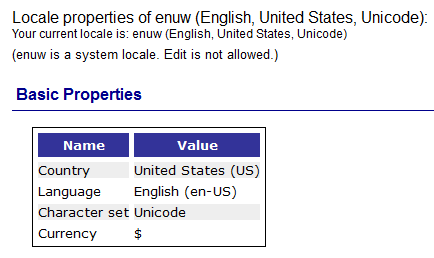InterSystems IRIS Locales and National Language Support
InterSystems IRIS Locales and National Language Support
An InterSystems IRIS locale is a set of metadata that defines storage and display conventions that apply to a specific country or geographic region. The locale definition includes the following:
-
Number formats
-
Date and time formats
-
Currency symbols
-
The sort order of words
-
The default character set (the character encoding of this locale), as defined by a standard (ISO, Unicode, or other).
Note that InterSystems IRIS uses the phrases character set and character encoding as though they are synonymous, which is not strictly true in all cases.
-
A set of translation tables (also called I/O tables) that convert characters to and from other supported character sets.
The “translation table” for a given character set (for example, CP1250) is actually a pair of tables. One table specifies how to convert from the default character set to the foreign character set, and other specifies how to convert in the other direction. In InterSystems IRIS, the convention is to refer to this pair of tables as a single unit.
InterSystems IRIS uses the phrase National Language Support (NLS) to refer collectively to the locale definitions and to the tools that you use to view and extend them.
The Management Portal provides a page where you can see the default locale, view the details of any installed locale, and work with locales. The following shows an example:

You can also use this page to see the names of the available translation tables. These names are specific to InterSystems IRIS. (In some cases, it is necessary to know the names of these tables.)
For information on accessing and using this Management Portal page, see Using the NLS Pages of the Management Portal.
InterSystems IRIS also provides a set of classes (in the %SYS.NLS and Config.NLS packages). See System Classes for National Language Support.